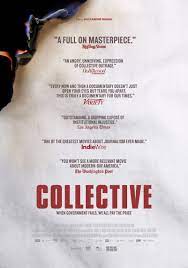
Collective (2020)
Available on Netflix and Prime Video
Directed, written, and produced by Alexander Nanau
Starring Catalin Tolontan, Camelia Roiu, and Tedy Ursuleanu
Collective is a documentary about corporate greed, government corruption, and inspiring investigative journalism in Romania. It has won many international awards, and is the first Romanian film to be nominated for an Oscar (Best Documentary Feature and Best International Feature Film).
The Plot: In October 2015, a fire breaks out at a nightclub In Budapest. (The film has a few minutes of film of this.) 27 people die immediately. Another 37 die in the ensuing weeks and months because of a lack of proper medical care, particularly because of bacterial infections among the burn victims. Early investigation by the editor of The Gazette, a sports newspaper, points to government corruption and a major scam with Hexi Pharma, the country’s largest drug manufacturer. Protests ensue. The government tries to deny it. The head of Hexi Pharma dies mysteriously in a car crash. More revelations come out. Eventually, the Social Democratic government is forced to resign, and the Minister of Health is replaced by an honest young guy… but in the next election, the Social Democrats win in a landslide.
What I liked about it: This is, as I said, a story about corporate greed and government corruption. But what made it work for me was the very thorough coverage of the role journalism played in the outcome. What a nice contrast to the advocacy journalism we have in the US today.
What I wondered: The entire film was shot from the start with static cameras, lighting, etc. That suggests that it was the editor of The Gazette that made the decision to create the documentary. And that made me question the authenticity of some of the scenes.
Critical Response
* “Collective presents a darkly effective overview of the cycle of political corruption and public cynicism that takes hold when government abrogates its responsibility to the people.” (Rotten Tomatoes)
* “A gripping, despairing exposé of institutional injustice.” (Justin Chang, Los Angeles Times)
* “A documentary for our times, deserving of widespread exposure.” (Jay Weissberg, Variety)
* “[The film] sketches out an honest, affecting, somewhat old-fashioned utopian example of what it takes to make the world better, or at least a little less awful.” (Manohla Dargis, The New York Times)
You can watch the trailer here.
